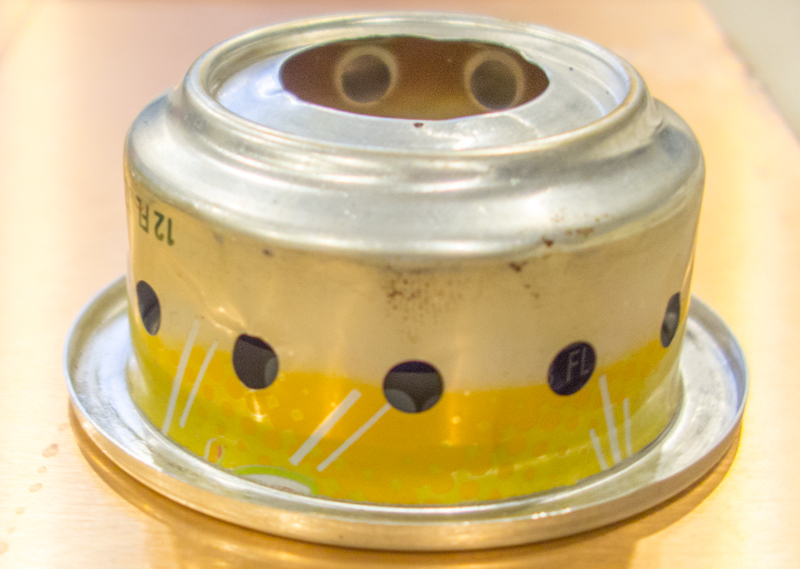
The title of this post is not referring to the stove bans in several states during summer months, which are becoming more and more frequent.
Table of Contents
- Stove Bans
- Cost Advantages of Alcohol Fuel Stoves
- Obsolescence
- Well, Nick You Live in California . . .
- The Administrative State
- Pournelle’s Iron Law of Bureaucracy
- Government by and for The People
- Yeah, But That Can’t Happen in the State I Live In
- Why California Banned Denatured Alcohol.
- Environmental Protection Agency (EPA)
- Alternative Fuels for Alcohol Stoves
Stove Bans
For those who are unfamiliar with these bans, different government agencies often ban the use of campfires and any stove without an On/Off valve to turn off the stove. Two popular backpacking stove types; solid fuel (usually Esbit) and alcohol stoves are usually explicitly banned. I do question the wisdom of banning solid fuel stoves, which I no longer use due to the high cost of the fuel.
The problem with alcohol stoves, along with any stove or campfire is user error, or perhaps better stated; a lot of people are plain stupid or careless. Except for when it is dark at night, the flame from alcohol stoves is difficult to see. Apparently some people can knock over their alcohol stove while in use (I find this difficult to do and have never had any problem like this) and some have started forest fires because they cannot use an alcohol stove properly.
I have no problem obeying these stove bans. They are put in place for a good reason.
Cost Advantages of Alcohol Fuel Stoves
It is pretty easy to make an alcohol stove from recycled soda cans or cat food cans. If you might be interested in building your own stove do a Google search for “soda can stove” or “pepsi can stove” or” fancy feast stove.”
Several years ago I did a cost analysis of several fuels and found that liquid gas stoves and alcohol fuel stoves were much, much cheaper to operate than gas canister or solid fuel stoves.
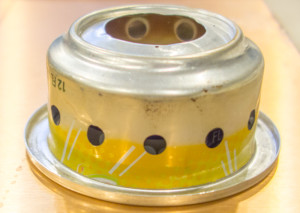
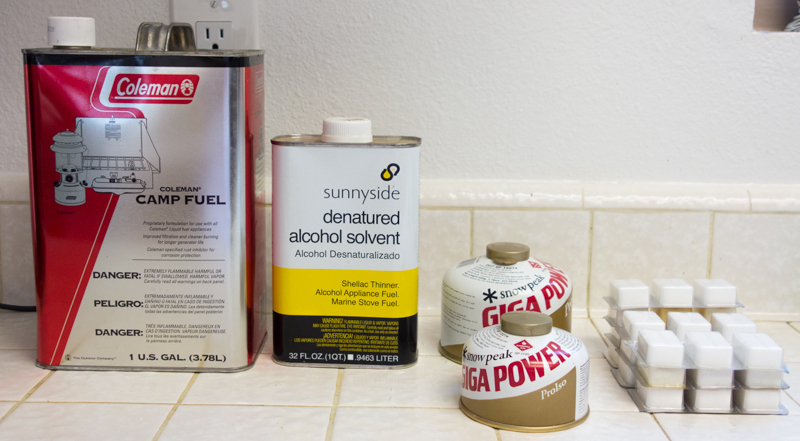
Since then I have mostly been using liquid fuel stoves that run on white gas (such as Coleman Fuel), or an alcohol stove using denatured alcohol as its fuel. At the time both were easy to find and inexpensive compared to other fuels.
Obsolescence
Earlier this year, in my long-term 35 year review of the Gaz Globetrotter stove, I complained that over the years several of my canister stoves became obsolete. Not because the stoves quit working, but because the fuel canisters were no longer available. The inability to purchase the fuel canisters rendered the stoves obsolete. Denatured alcohol is no longer legal to sell or purchase in California, which just about makes my alcohol stove obsolete, as I found this fuel to be best for several reasons.
Well, Nick You Live in California . . .
My friends who live in other states often question why I continue to live in the People’s Republic of California with all our regulations and high taxes. The reason I don’t move is because of our great climate and so many outdoor recreation opportunities.
But the people of California didn’t ban denatured alcohol. It was banned by a government agency that doesn’t have a single elected representative of the people, the California Air Resources Board. From Wikipedia:
The Administrative State
A law professor at George Mason University School of Law, Michael Greve, coined the term Administrative State. Greve defines this as,
Professor Greve advocates that this is contrary to the intention of our founding fathers and these government agencies become corrupt seeking power over the people, resulting in despotism.
Pournelle’s Iron Law of Bureaucracy
Jerry Pournelle , the famous polymath, observed this shift in bureaucracies and developed “Pournelle’s iron law of bureaucracy”:
Later Pournelle refined the law to make it easier to understand:
. . . in any bureaucratic organization there will be two kinds of people: those who work to further the actual goals of the organization, and those who work for the organization itself. Examples in education would be teachers who work and sacrifice to teach children, vs. union representatives who work to protect any teacher including the most incompetent. The Iron law states that in all cases, the second type of person will always gain control of the organization, and will always write the rules under which the organization functions.
Government by and for The People
Today it is impossible for any one person to keep up with all the laws passed by local, county, state, federal legislatures, plus all the non-elected entities in our country. It is especially difficult to track all the bureaucracies that now create most of our laws.
Yeah, But That Can’t Happen in the State I Live In
Don’t be so sure. A great example is vehicle emission laws. Years ago, California adopted much more stringent standards than the Federal Government. For many years automakers built two separate models of each car: one for sale in California and one for sale in the other 49 states. Trying to adhere to the many demands of competing agencies that included more and more separate testing and reporting, the carmakers gave up and now build their cars and light trucks to meet the more stringent car and light standards of California. Many states have adopted California’s periodic emission testing methods and expensive testing equipment.
Along with this, we have wealthy moneyed organizations in California lobbying in other states and in Federal Government to institute California’s “better way” across the entire country.
Why California Banned Denatured Alcohol.
I won’t get into the scientific particulars, especially since I am not a scientist. California has banned most consumer and industrial products that contain volatile organic compounds (VOC). Literally thousands of products have been banned and manufacturers must reformulate their products for sale in the Golden state. The range of products includes paints, varnishes, waxes, cleaning, disinfecting, cosmetic, degreasing and hobby products. California has determined VOCs contribute to climate change.
In California we can no longer buy Mineral Sprits now either. As I explained in these two threads about my TrailStar shelter and my Mega Light shelter, diluting silicone with mineral spirits is a popular way to seam seal a tent. No longer the case in my state.
Instead of a long list of affected products, I will just say that we now have cleaners that do not clean, paint remover that doesn’t remove paint, paint and lacquer thinners that don’t thin, paints that don’t paint well, and so on.
There are states nearby that still sell products that work. Often our out of state camping trips include a stop along the way to buy anything I am running low on. A recent trip obtained these items.
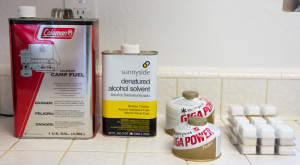
Environmental Protection Agency (EPA)
The EPA has thousands and thousands of documents relating to VOCs. Most that I have read are concerned with personal health effects in their handling, especially when used indoors. From what I have read, the EPA’s focus is on communication to warn of side effects if the materials are not handled safely per the products instructions for use and storage – in other words – read the damn instructions!
Keep in mind I haven’t done a comprehensive review of EPA documentation of VOCs. So take my observations with a grain of salt.
Alternative Fuels for Alcohol Stoves
Everclear (190 proof)
This is a brand name for grain alcohol that contains 95% alcohol. I hear it works really well. But few states allow its sale because it is alcohol that can be consumed – the same stuff you find in almost all liquors.
HEET (yellow bottle version)
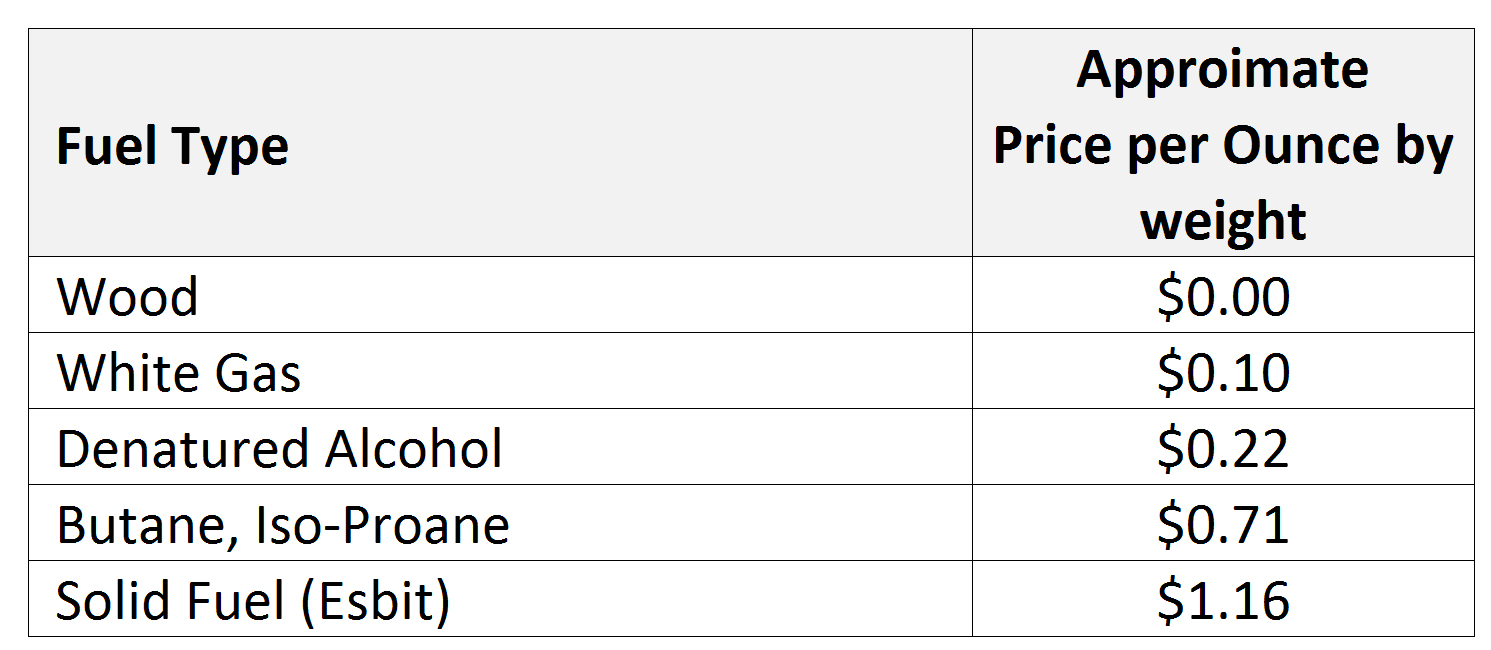
This stuff works well in an alcohol stove. BUT, it is 95% methanol and can be dangerous to our health. Not only from the fumes of the product itself, but from the fumes generated when burned in a stove. The product is toxic and can even be absorbed into the body from skin contact. I haven’t used it for probably 10 years or so.
You do not want to use HEET that is sold in the red bottles. It works poorly in a stove.
99% Isopropyl Alcohol
Also known as rubbing alcohol. Lower alcohol content (91%, 70%, 50%, etc.) means the alcohol content has been diluted with mostly water. 99% Isopropyl will burn in an alcohol stove. Actually it will boil water faster than most other fuels used in these kinds of stoves. The amount of soot leftover on the stove and pot is considerable. For me, it is so bad that the fuel is a very poor choice for stove fuel.
So that’s about it for fuel options that are viable for use in alcohol stoves.
When (not if) your state follows the lead of the People’s Republic of California, then your alcohol stove will be rendered obsolete.








































